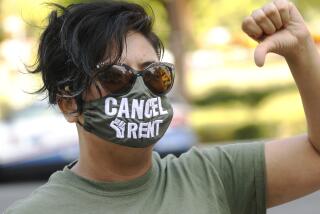Thousand Oaks Council Cultivates Courteous Attitude
- Share via
A modicum of civility returned to Thousand Oaks City Hall this week as the City Council reviewed a code of conduct designed to limit backbiting among members and curb personal attacks from residents.
But though council members were pleasant to one another, they were immediately criticized by residents who feared the code would quash dissent.
For the record:
12:00 a.m. July 29, 2005 For The Record
Los Angeles Times Friday July 29, 2005 Home Edition Main News Part A Page 2 News Desk 1 inches; 41 words Type of Material: Correction
City Hall civility -- An article in Thursday’s California section about renewed civility at Thousand Oaks City Hall contained a quote from Terry Francke, general counsel for Californians Aware, that was followed with “she said.” It should have been “he said.”
At its last formal session before a seven-week summer recess, the council began Tuesday night’s meeting by reviewing results of a July 19 workshop, where it adopted a new mission statement and customer service philosophy, 10 major goals and a list of “council norms” to guide conduct during meetings.
The rules include treating one another and staff members with respect and pledging not to make assumptions about one another or question one another’s motivations.
Thousand Oaks, an affluent bedroom community north of Malibu, has struggled with council infighting for more than a dozen years, City Hall watchers say. The discussion of how much should be built, including housing and business development, has raged back and forth.
The latest battle dividing the town was the April departure of former City Manager Phil Gatch, a veteran city employee. Some residents contend that a council member forced Gatch’s retirement by suggesting he resign.
After Tuesday night’s meeting, Mayor Claudia Bill-de la Pena said the new guidelines seemed effective.
“I think it went well,” she said. “The norms were being tested, and I’m sure the norms will continue to be tested after the summer break. And it remains to be seen then how we interact with each other, including the public.”
But frequent council critics challenged city leaders about guidelines that public speakers be prohibited from addressing individual council members and that council members not encourage the public to come to meetings specifically to criticize another member.
“There is strong reason to mistrust any man or woman with the power to endanger free speech, because that is not good government,” said former city Planning Commissioner Laura Lee Custodio, who ran unsuccessfully for council in 2002.
“The pro-growth majority of this council has the power. And now they want everybody to make nice and silence the community,” she said. “I will tell you, it won’t happen. You have energized people. You have infuriated the people, the grass-roots organizations of this community.”
Mary Harris, an activist for the disabled, said she felt “like a muzzled animal” and worried that her critiques of handicapped access and occasional private meetings with council or staff members might put her in violation. “I care about issues.... I know sometimes the truth hurts, but, hey.”
Terry Francke, general counsel for Californians Aware, a nonprofit group dedicated to government accountability and accessibility, said Thousand Oaks council members border on becoming censors if they monitor too closely how vigorously residents denounce them.
“You have to be ready to take criticism, or even name-calling, as a cost of being in office. It’s called politics. It may not be the best form of politics, but it’s reasonably inevitable.... It’s sort of the psychological cost of doing business,” Francke said.
“If citizens are not free to criticize the acts or omissions of individual elected officials in a forum like this, then it’s free speech in name only,” she said.
But Peter Scheer, executive director of California First Amendment Coalition, an advocacy group for open government, said so long as such rules are enforced so that supporters and opponents are restricted equally, then there isn’t necessarily a problem.
“You must be allowed to state the points of views and the criticisms you wish, but you can be required to do that in a way that’s civil, respectful of others and reflects basic courtesy,” Scheer said. “City Council meetings don’t have to degenerate to the level of Internet chat rooms.... By way of example, look at any appellate courtroom -- you have to abide by rules of civility and behavior. And if you don’t like it, tough.”
Councilman Andy Fox, who at the workshop suggested adopting norms similar to those the council had in place in the mid-1990s, said decorum had improved this week and that the council was headed in the right direction.
“I think the public could see the council’s efforts to work as a team and support one another, while at the same time bringing our own individual perspectives to the discussion. It was very constructive tonight,” Fox said.
But before extending a compliment to the mayor, Fox called over to Bill-de la Pena for her permission to comment on how smoothly the initial meeting ran. That was to adhere to a norm: Do not to speak for other council members in the media.
More to Read
Sign up for Essential California
The most important California stories and recommendations in your inbox every morning.
You may occasionally receive promotional content from the Los Angeles Times.













